Why hCG May Not Preserve Your Fertility on TRT
Article Summary
Although studies show that hCG can help maintain fertility in men on TRT (4), other research shows that hCG's effectiveness varies depending on user health (8). Since low testosterone is often caused by poor health (5), hCG may be less effective in practice than reflected in the literature. Low testosterone can be usually be corrected naturally, and natural testosterone optimization strategies are the best way to reliably preserve fertility, so they should be strongly considered in lieu of TRT.
If you’ve been seriously considering Testosterone Replacement Therapy (TRT), you’re probably aware that it suppresses fertility (4); an undesirable side-effect for men who wish to father children.
A common “solution” is the concurrent use of hCG, which proclaims to preserve fertility in men on TRT.
But is this really true? Or is it too good to be true?
In this article, I’m going to explain:
- How hCG works, and why taking it may not safeguard your fertility.
- Why you probably don’t need TRT in the first place.
- How you can optimize your testosterone levels naturally.
Joe’s Story: The Shortcut That Backfired
As an NASM-certified personal trainer, one of my duties is to conduct personal fitness evaluations, where we unpack all aspects of people's health and lifestyle.
During a recent consultation, "Joe" (alias name for confidentiality), a 42 year old father and software developer, told me that he'd been on TRT for nearly two years.
Joe also mentioned that his was goal to get in better shape for his future children, because he regretted not being fit enough to play with his current child.
When I asked if he knew that TRT that can suppress fertility, Joe looked uneasy. He said he thought he was “covered” because his TRT provider had him on hCG as well.
At the time, I wasn’t sure either, but after intensive research, I discovered that although hCG can help, it does not guarantee fertility preservation.
My experience with Joe made me wonder how many other men may be taking TRT under the impression that hCG will safeguard their fertility.
Since most information online solely advertises hCG’s fertility preserving potential, I wrote this article to share the contrary evidence, so that you have a complete and balanced understanding to best inform your decisions.
Before diving into the details, I’m going to begin with the end in mind, because if there’s anything you should take away from this article, it's this…
You Probably Don’t Need TRT
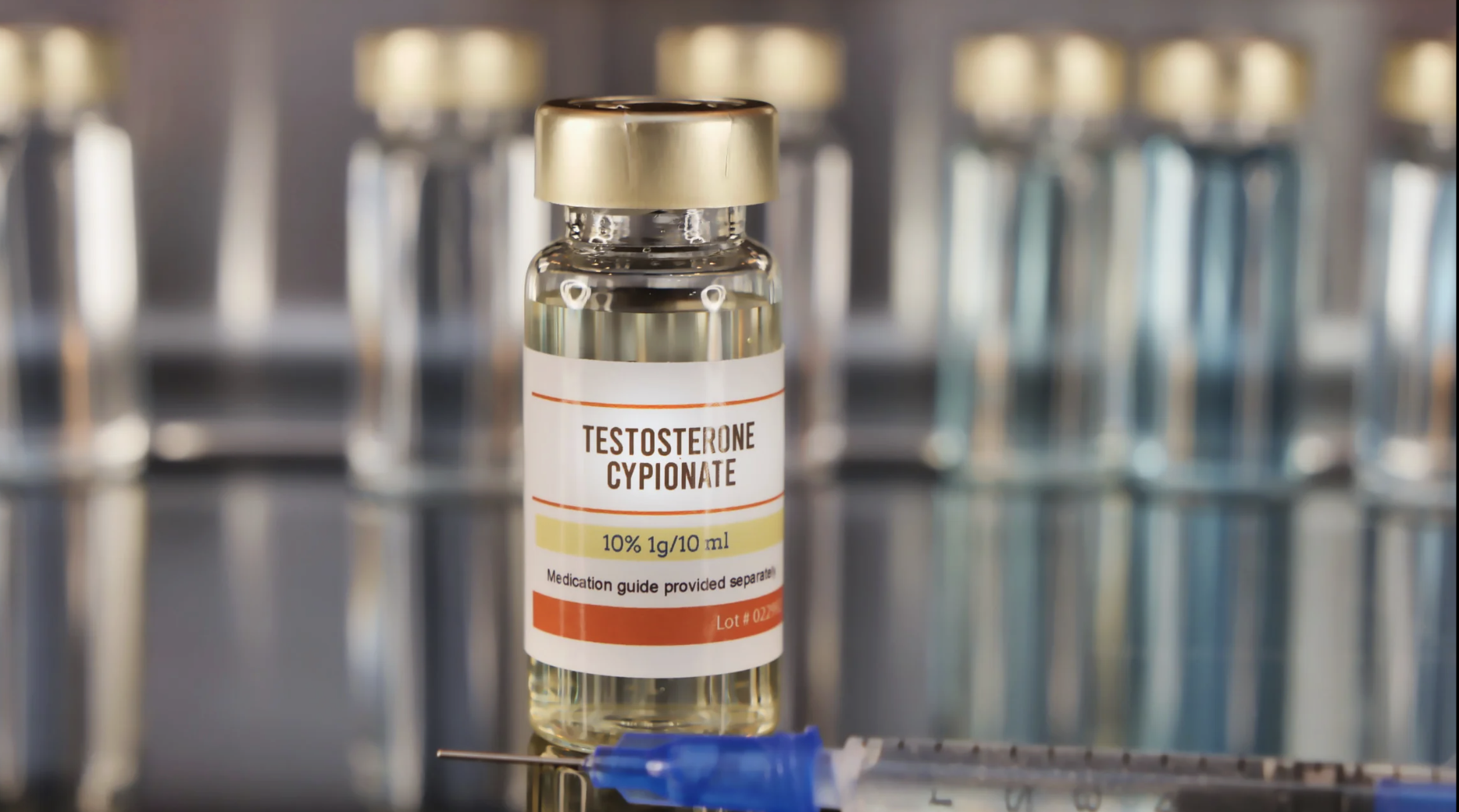
There are four primary causes of low testosterone:
- Genetic conditions
- Severe testicular trauma
- Advanced age (60+)
- Poor general health
Unless your low testosterone is caused by 1-3, which are outside of your control, low testosterone is almost always the result of unhealthy habits, which are within your control.
TRT Treats Symptoms, Not Causes
While TRT alleviates the symptoms of low testosterone, it doesn’t address the unhealthy habits that caused it, and these can give rise to other health issues.
Take Joe, whose low testosterone was primarily caused by obesity, lack of exercise, and insufficient sleep.
Although Joe’s chronic fatigue and low libido symptoms improved when he started TRT, his unhealthy habits didn’t change. He still skipped workouts, slept five hours per night, and carried 28% body fat; all of which elevate his risk of nearly every chronic disease.
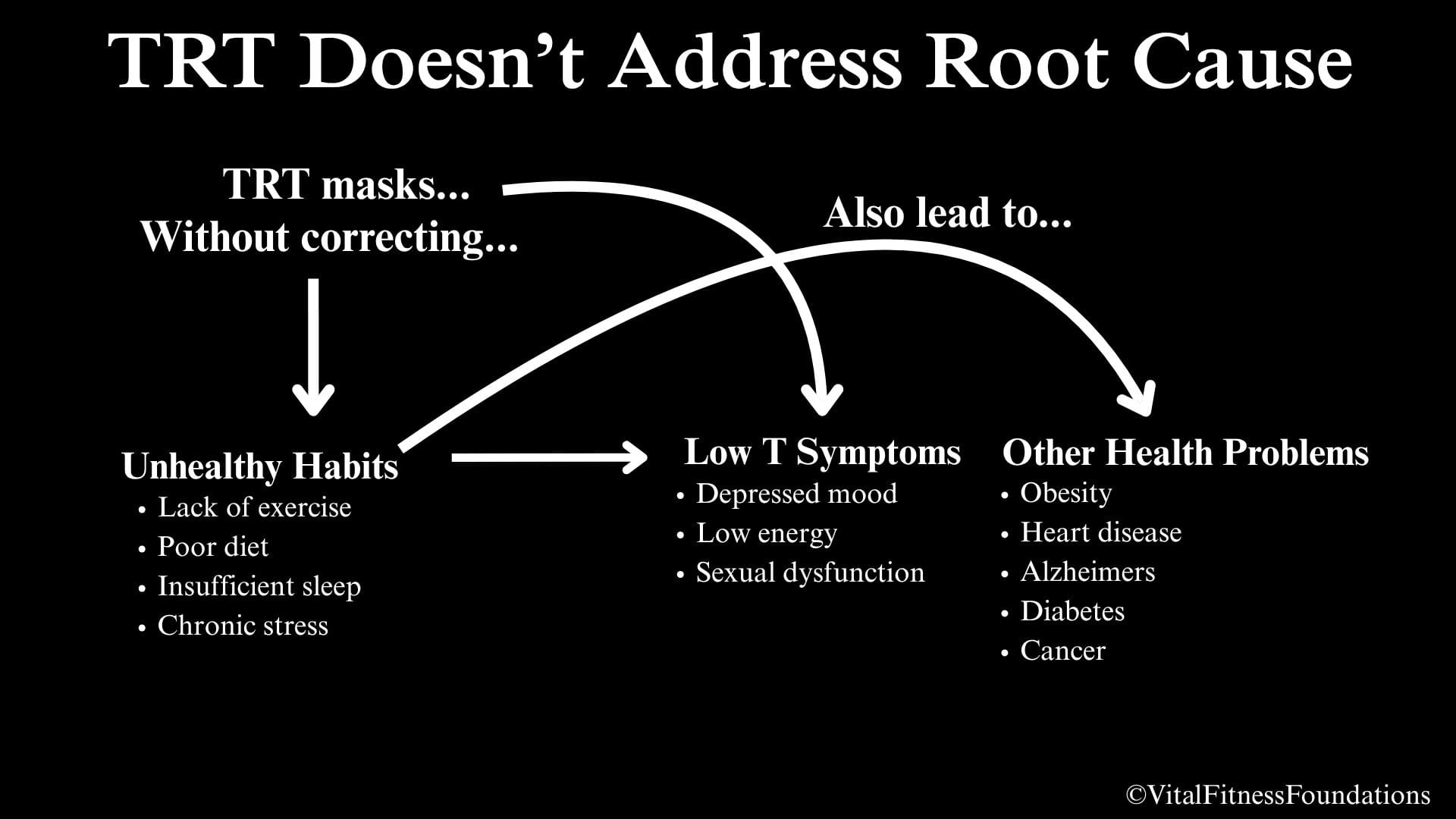
So even though TRT brought Joe’s testosterone levels up to "normal" on paper, on the inside, he was still just as unhealthy as he was before he started TRT.
In cases like Joe's, low testosterone can be reversed by correcting the unhealthy habits that caused it, meaning TRT is completely unnecessary.
TRT Stunts Character Development
On a deeper level, taking TRT robs you of the opportunity to develop your character.
Before taking TRT, Joe paid for a gastric bypass to lose weight instead of improving his exercise and eating habits; an example of seeking reward without effort.
This pattern manifested again when the time came to address his low testosterone; Joe chose to go on TRT instead of developing the discipline to instill healthy habits.
Joe's lack of discipline may explain why he’s divorced, and was let go by his former employer.
I point this out not to berate Joe, but to highlight the fact that your core character traits bleed into all aspects of your life, and taking TRT instead of developing the character traits required to improve your health may cost you in ways you didn’t expect.
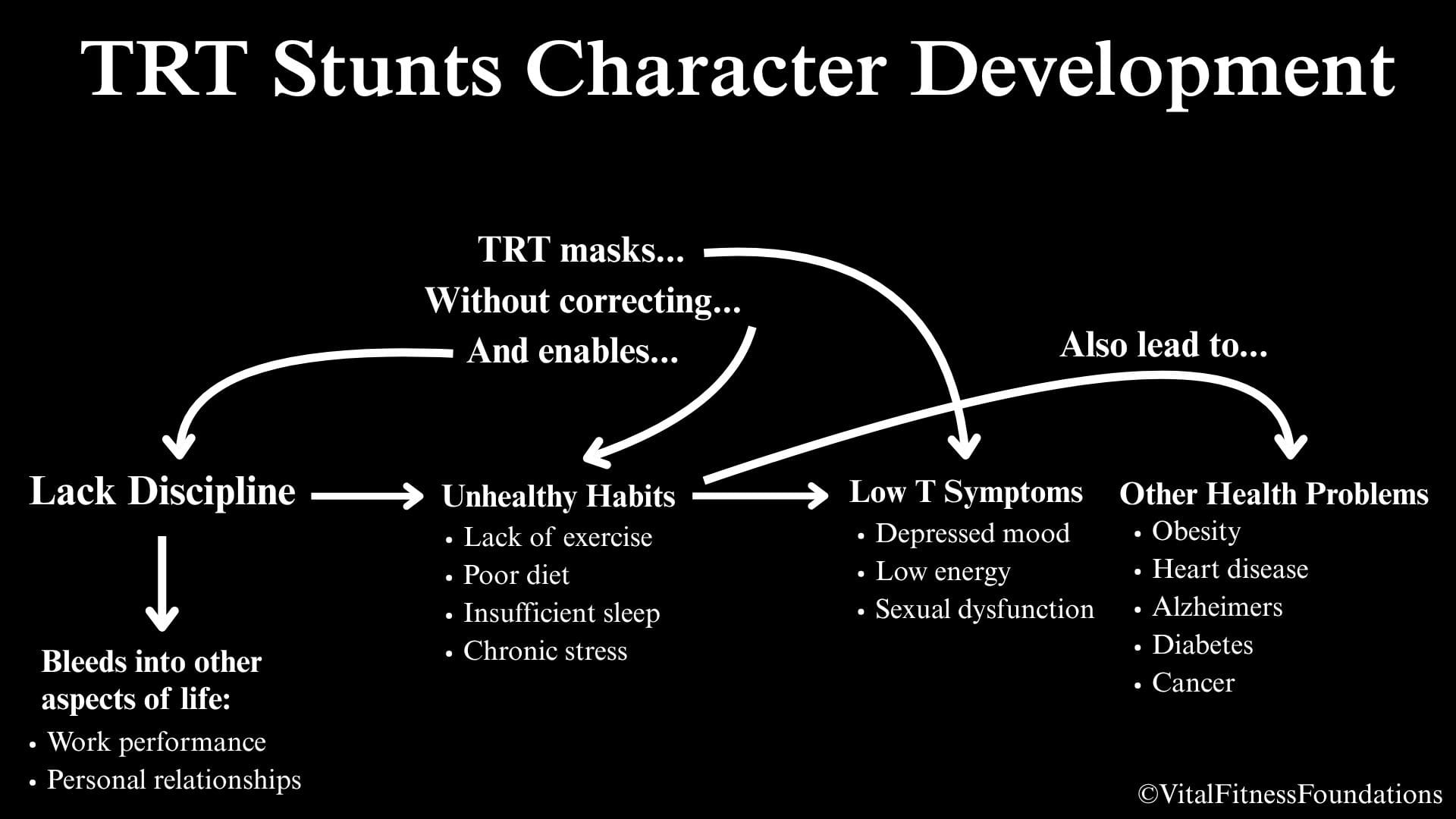
So before reading on, take a hard look in the mirror and ask yourself if you really need TRT, or if you’re subconsciously seeking relief without effort.
Why You Should Increase Your Testosterone Levels Naturally
Unless TRT truly is your only option, you’re better off restoring your testosterone levels naturally, for three main reasons:
- You’ll address root causes and improve overall health.
- You'll develop transferable character traits.
- You'll preserve fertility with certainty.
At the end of this article, you can find a list of actionable protocols that you can use to optimize your testosterone levels naturally, which is precisely what we help men do in the Testosterone Transformation Academy.
With that context established, to understand why hCG doesn't guarantee fertility preservation, you first need to understand how sperm is made, because sperm is what makes a man fertile.
How Sperm Is Made
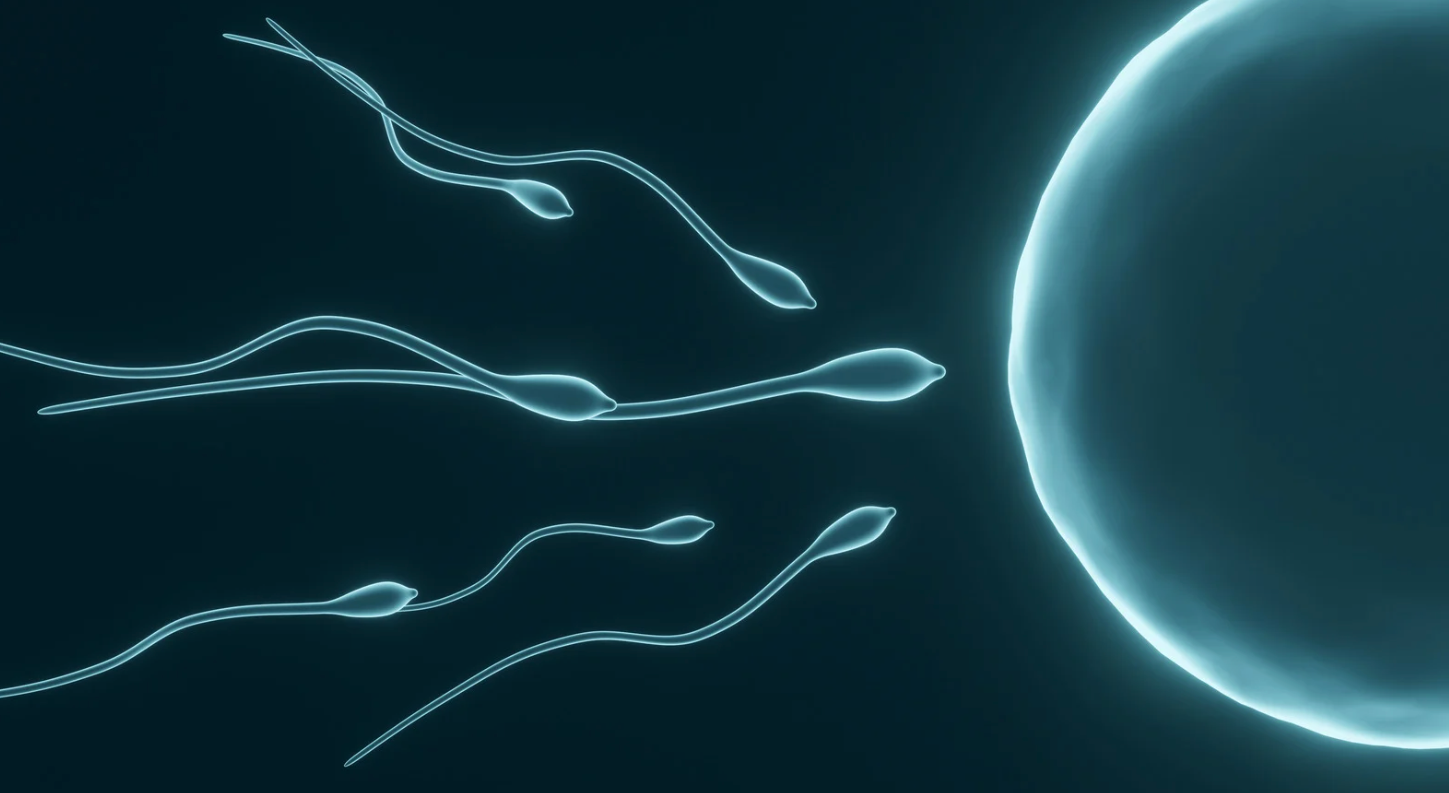
The process of sperm production is called spermatogenesis, and while this occurs in the testes, the first step starts all the way up in the brain.
In the Brain:
- A gland called the hypothalamus secretes Gonadotropin Releasing Hormone (GnRH).
- GnRH tells another gland, called the pituitary, to release two hormones:
- Follicle Stimulating Hormone (FSH)
- Luteinizing Hormone (LH)
- FSH & LH travel through the bloodstream down to the testes where they bind to two types of cells:
In the Testes:
- LH binds to Leydig cells, stimulating testosterone production.
- FSH binds to Sertoli cells, which initiates sperm production.
Sertoli cells can only complete sperm production with the help of intratesticular testosterone from neighboring Leydig cells (intra = within, testicular = testicles).
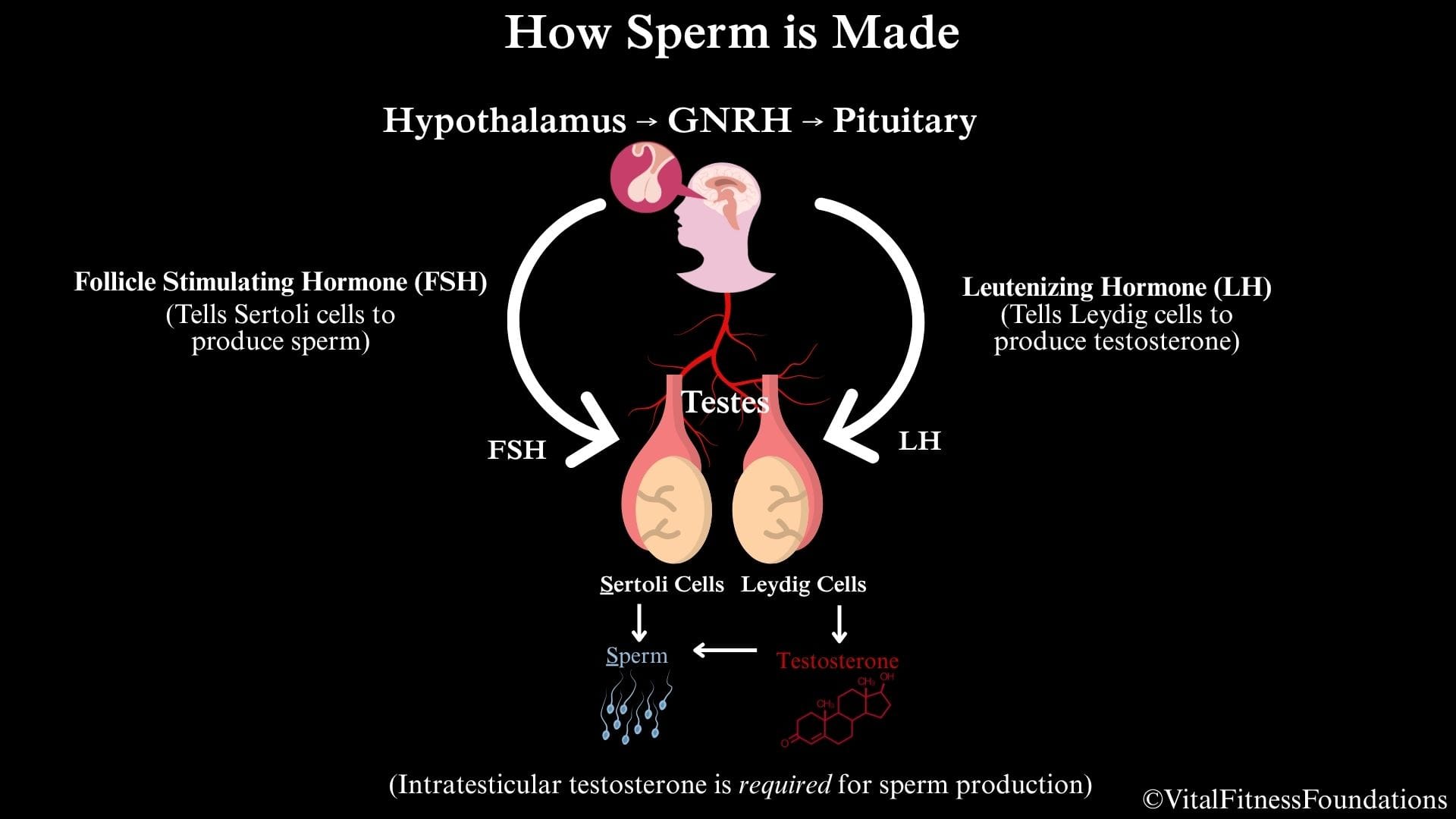
How TRT Suppresses Fertility
You might be wondering: "If testosterone is required for sperm production, why would TRT suppress fertility?"
Quick Refresher:

The hypothalamus functions like a thermostat.
It constantly measures testosterone levels and adjusts how much GnRH it secretes to keep them in the goldilocks zone; not too high, and not too low.
When testosterone from outside the body (such as TRT or anabolic steroids) floods the bloodstream, the hypothalamus "thinks" that testosterone levels are too high, so it secretes less GnRH to bring testosterone levels back down to normal.
Less GnRH means less LH & FSH from the pituitary, which suppresses downstream testosterone and sperm production in the testes.
TRT cannot support sperm production because the testes are a one way street; testosterone can only exit the testes into the blood.
Since TRT is injected into the bloodstream, it cannot enter the testes. Therefore, only testosterone produced inside the testes (from LH signaling) is capable of driving sperm production.
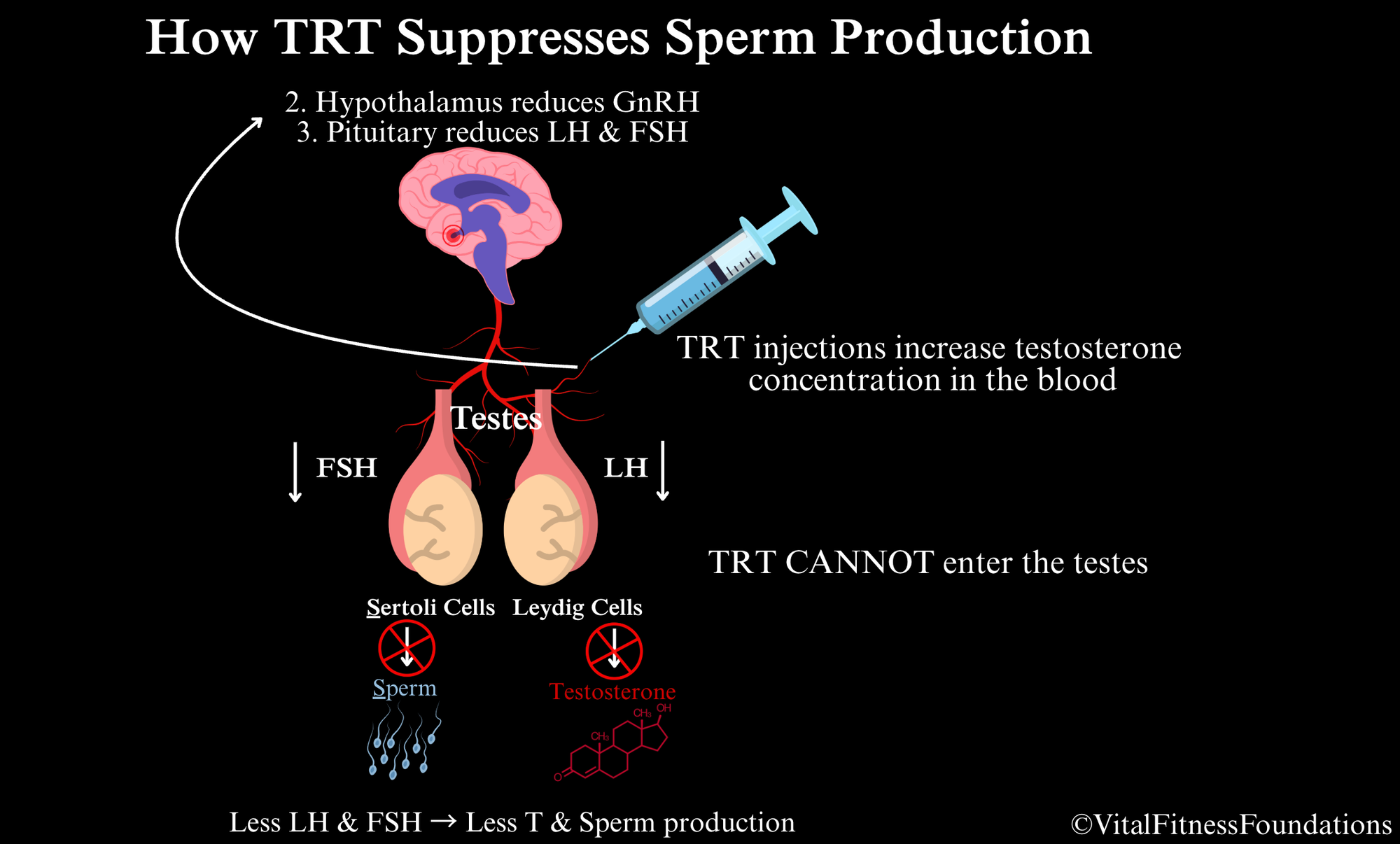
This is where hCG, in theory, can save the day for men on TRT who wish to remain fertile.
How HCG Works
In men, Human Chorionic Gonadotropin (hCG) mimics LH.
When hCG is injected into the blood, it binds to LH receptors on the Leydig cells in the testes and "tells" them to produce testosterone; the same way that LH from the pituitary does.
In this way, hCG maintains intratesticular testosterone production, which is crucial for sperm production, but is suppressed by TRT (4).
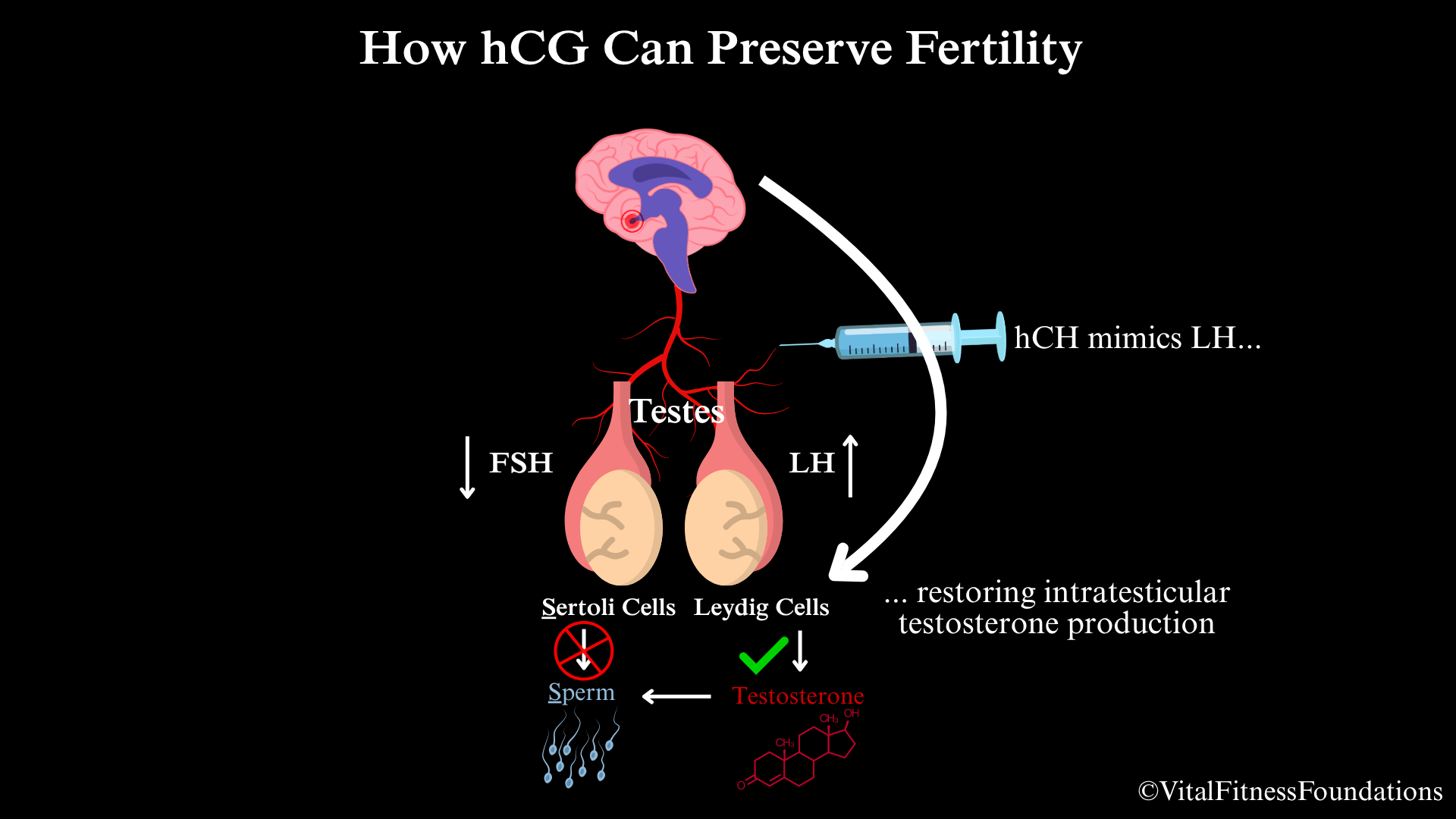
This is why there is strong evidence showing that hCG can preserve male fertility when used alongside TRT (4).
Although the research is promising, hCG has limitations that all men considering TRT should be aware of.
Why hCG May Not Guarantee Fertility
Duration of TRT Use
Research shows that hCG can preserve spermatogenesis for up to one year (4), but beyond that, its efficacy is unknown.
The publishers of that research stated; "concurrent hCG use can preserve fertility in hypogonadal males desiring pregnancy while on TRT. Longer follow-up is needed to determine whether this benefit is sustained" (1).
For men who take TRT for longer than one year, a word of caution is in order, because there is evidence to suggest that hCG’s efficacy may wane over time…
LH Receptor Desensitization
To understand why, consider the analogy of caffeine tolerance.
In the beginning, one cup of coffee is enough to give you the jitters.
But over time, your brain becomes desensitized to caffeine, and you need more and more to feel the same effects.
Similarly, when LH receptors are continuously exposed to hCG, they can become “numb” to the message over time, a phenomenon termed “receptor desensitization.”
hCG has both a higher affinity for LH receptors and a much longer half-life than LH (30 minutes for LH, 36 hours for hCG), meaning it sends a stronger signal than the testes would normally receive from natural LH, and this signal lasts for a longer period of time (4).
Going back to the caffeine analogy, LH is like green tea, whereas hCG is like an energy drink; its effects are much more potent than what occurs naturally.
For this reason, prolonged hCG may desensitize LH receptors, meaning fertility protection could fade the longer you’re on it.
hCG May Be Less Effective In Unhealthy Men
One limitation of the research demonstrating hCG's ability to maintain spermatogenesis is that the study participants were healthy men with normal testosterone levels (termed "eugonadal) (4).
This is noteworthy, because other research shows that hCG's ability to maintain spermatogenesis is in part contingent upon the health status of the user (8).
Since poor health is a primary cause of low testosterone (5), men seeking TRT are more likely to be systemically unhealthy, which may reduce hCG’s efficacy in the very demographic of men likely to use it.
Case in point; Joe's body fat percentage was 28%, putting him in the obesity category.
It's well established that obesity reduces testosterone levels and sperm count, and thus, male fertility (5).
Here’s how Joe’s obesity could reduce hCG’s ability to keep him fertile while he takes TRT…
Obesity Raises Estrogen Levels

Adipose tissue (fat cells) contain an enzyme called aromatase, which converts testosterone into estrogen. So the more body fat a man has, the more of his testosterone gets converted into estrogen.
For this reason, obese men tend to have too much estrogen and not enough testosterone.
While estrogen serves important roles in men, too much is problematic for fertility.
Excess Estrogen Lowers Testosterone & Sperm Count
One of estrogen’s functions in males is the inhibition of GnRH secretion (7), which is a normal mechanism to keep hormone levels in balance.
But in men with high estrogen, this inhibitory effect is amplified, leading to detrimental reductions in testosterone and sperm production downstream (7).
TRT Can Increase Estrogen Levels in Obese Men
Although TRT increases serum testosterone concentrations, since obese men have high levels of aromatase, their bodies convert a significant portion of TRT into estrogen (9).
This is problematic, because, in addition to inhibiting GnRH production in the brain, high estrogen levels in the testes have been shown to downregulate genes that produce proteins which drive testosterone & sperm production (7)
In sum, excess estrogen counteracts male fertility on two fronts:
- “Upstream” (in the brain) by reducing GnRH secretion.
- “Downstream” (in the testes) by downregulating testicular gene expression.
hCG May be Less Effective In Obese Men
Obesity itself hampers male reproductive function independent of its estrogen induced effects.
Obesity causes systemic inflammation, which is detrimental to testicular function consequent to increased oxidative stress.
Us men have scrotums so that our testicles remain cooler than our core body temperature; around 93.2ºF is ideal for sperm production. Obesity increases scrotal temperature, thereby impairing testicular function.
For these reasons, hCG may be less effective at preserving fertility in obese men, because it has to overcome all of the ways in which obesity impairs sperm production, which could counteract hCG's fertility promoting effects.
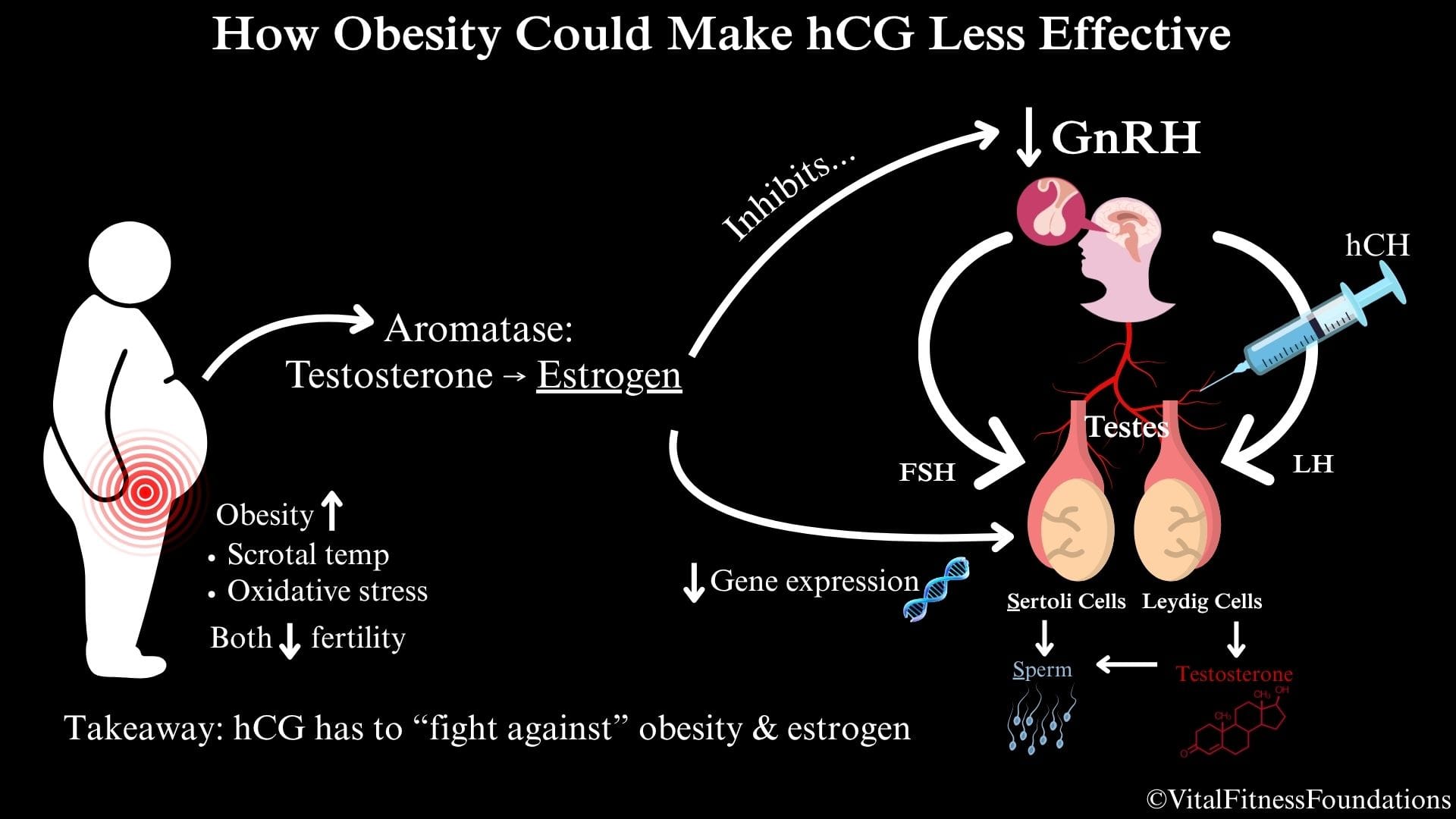
hCG May Need "Help" From Aromatase Inhibitors & SERMs
While obesity is the most common cause of high estrogen, it isn’t the only one.
Aside from genetic and medical conditions, chronic stress, alcoholism, and exposure to estrogen mimicking chemicals called xenoestrogens can contribute to high estrogen levels in men.
Regardless of the cause, high estrogen, like low testosterone, is an indicator of poor health, and as such the two often arise together.
Since hCG alone may not always suffice to maintain fertility in men with high estrogen, the addition of an aromatase inhibitor or Selective Estrogen Receptor Modulators (SERMs) may be required.
Aromatase inhibitors inhibit the activity of aromatase (the enzyme that converts testosterone into estrogen), thereby rebalancing a low testosterone to estrogen ratio.
SERMs occupy estrogen receptors, preventing it from binding and exerting its effects.
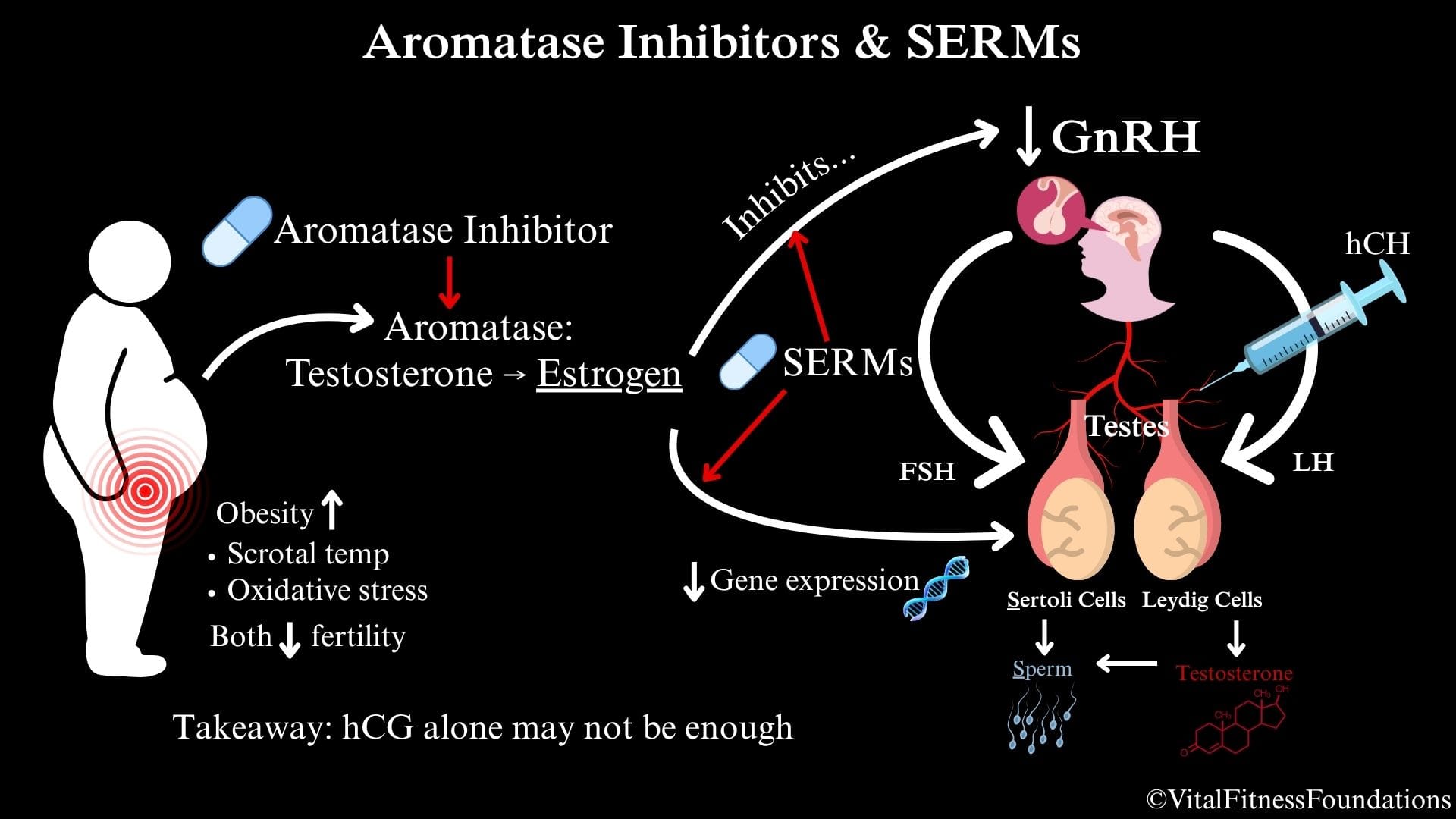
Once again, Joe’s story makes for a great example in this context.
Although Joe is obese, he was not prescribed an aromatase inhibitor or SERM by his TRT provider, so his high estrogen levels could counteract hCG's fertility preserving effects.
What Third Party TRT Providers Can Miss
Joe's case provides a perfect example of some of the risks of acquiring a TRT prescription through a third party company.
Semen Analysis

First of all, his provider did not require him to provide an initial semen analysis to estimate his baseline reproductive potential, a practice that is strongly encouraged in the frontline scientific literature (4).
Nor did they require any follow-up semen analyses to track his fertility over time, which is recommended to be performed every two months to ensure fertility is being maintained (4).
Additional Drugs
Joe’s clinic only tested his blood testosterone levels to ensure that they were low enough to justify a TRT prescription, but did not measure his other hormone levels.
If they did, they would’ve likely found that Joe’s estrogen levels were elevated due to his obesity, which would warrant the addition of an aromatase inhibitor or SERM.
Fertility Restoration Protocols
Lastly, Joe was not informed of the fertility restoring protocols that men are recommended to follow when planning for pregnancy, which involves cycling off TRT entirely and switching to hCG only (4).
Unfortunately, healthcare providers can mismanage the details of TRT prescriptions in similar ways.
What Your Doctor Might Not Know

One survey revealed that 25% of urologists (doctors who specialize in male reproductive health) reported that they would use TRT to promote sperm production in infertile men, which is completely paradoxical because it’s clear TRT suppresses fertility (7).
Given this level of ignorance regarding the basic mechanisms of how TRT affects fertility among urologists, it is doubtful that primary care generalists are aware of all the intricacies involved in maintaining fertility in men on TRT.
The key point is that fertility preservation on TRT requires continual monitoring on the part of the provider, close compliance on the part of the user, and a thorough understanding of the details necessary to protect fertility in both parties.
While fertility maintenance on TRT is complex, if fertility is lost, there is strong evidence that it can be regained within 6 months to 2 years in nearly all cases (6).
The Case for Natural Testosterone Optimization
No Risk Of Infertility
Although the risk of permanent fertility loss is small, not using TRT at all is the only surefire way to safeguard your fertility with 100% certainty.
Solves Root Cause
In the process of identifying the root causes of your low testosterone, you will discover underlying health problems that would otherwise contribute to the development of other chronic diseases if left undetected.
Develops Your Character
In the process of implementing healthful habits, you will develop character traits and skills like discipline, time management, and delayed gratification, which will positively influence all other aspects of your life.
Most importantly, your newfound vitality in conjunction with your newly developed character traits will make you into the type of man this world needs; a strong one who can contribute to society at his fullest potential.
How to Optimize Your Testosterone Levels Naturally
I strongly encourage you to try the following testosterone optimization challenge for six months before going on TRT. It’s based on the exact formula we use to help our clients optimize their testosterone levels naturally.
Training:
- Strength train for 1 hour 3-5 days per week.
- Alternate strength training days with 30-60 minutes of moderate intensity Zone II cardio
- Aim to get 10,000 steps per day outside of structured exercise.
The training program below is specifically designed for testosterone optimization. Feel free to use it.

Nutrition:
Follow the paleo diet as strictly as you can. Research shows that the paleo diet increases testosterone levels (2).
For more information on the paleo diet, check out the article below.
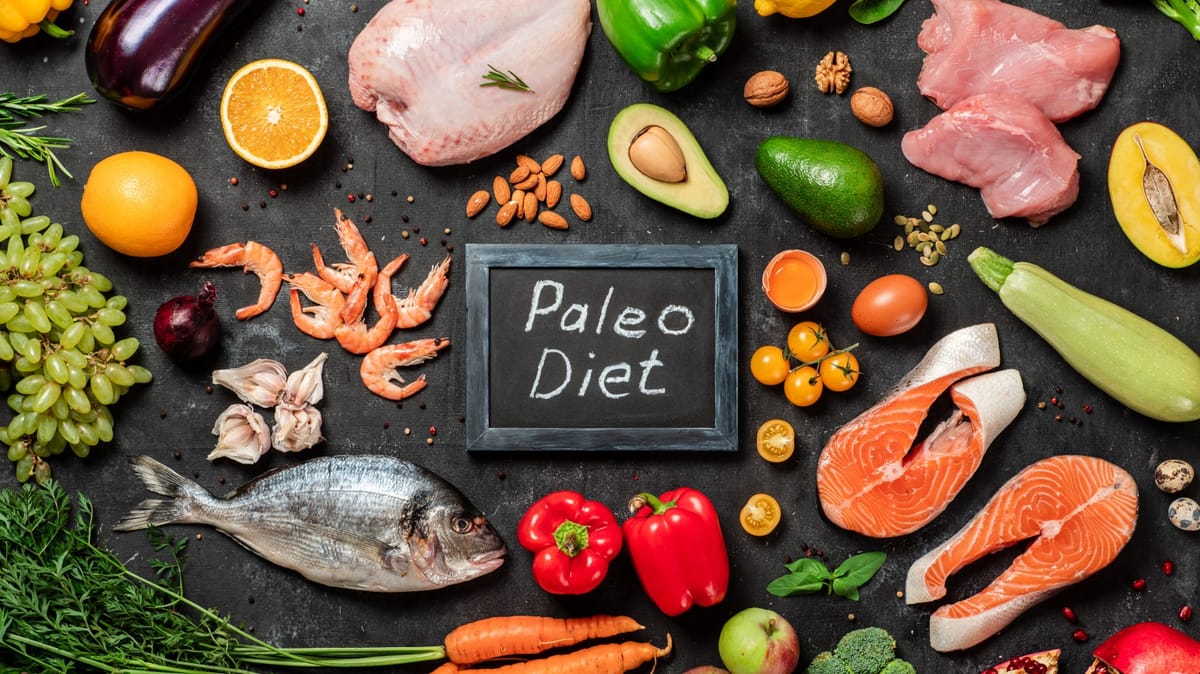
Lifestyle:
- Sleep - Dialing in your sleep is crucial. Quantity and quality are equally important. The guide below outlines everything you need to know about sleep, and comes with with a checklist to help you implement each protocol.

In this video, I go over all of the steps necessary to get the best sleep of your life.
- Stress - Chronic stress can lower your testosterone levels by increasing cortisol, which impedes testosterone from performing its various functions.
The best antidote to stress I've ever discovered is meditation, which, when paired with Stoicism, will fortify your mind against any difficulty you encounter in life.
In this video, I explain how you can use mediation to increase your testosterone levels.
In this video, I explain how you can use Stoicism to increase your testosterone levels.
- Endocrine Disrupting Chemicals (EDCs) - I studied how these chemicals affect male reproductive health my entire senior year of college and let me tell you, they are noxious. Use the guide below to inform yourself on how to avoid them.
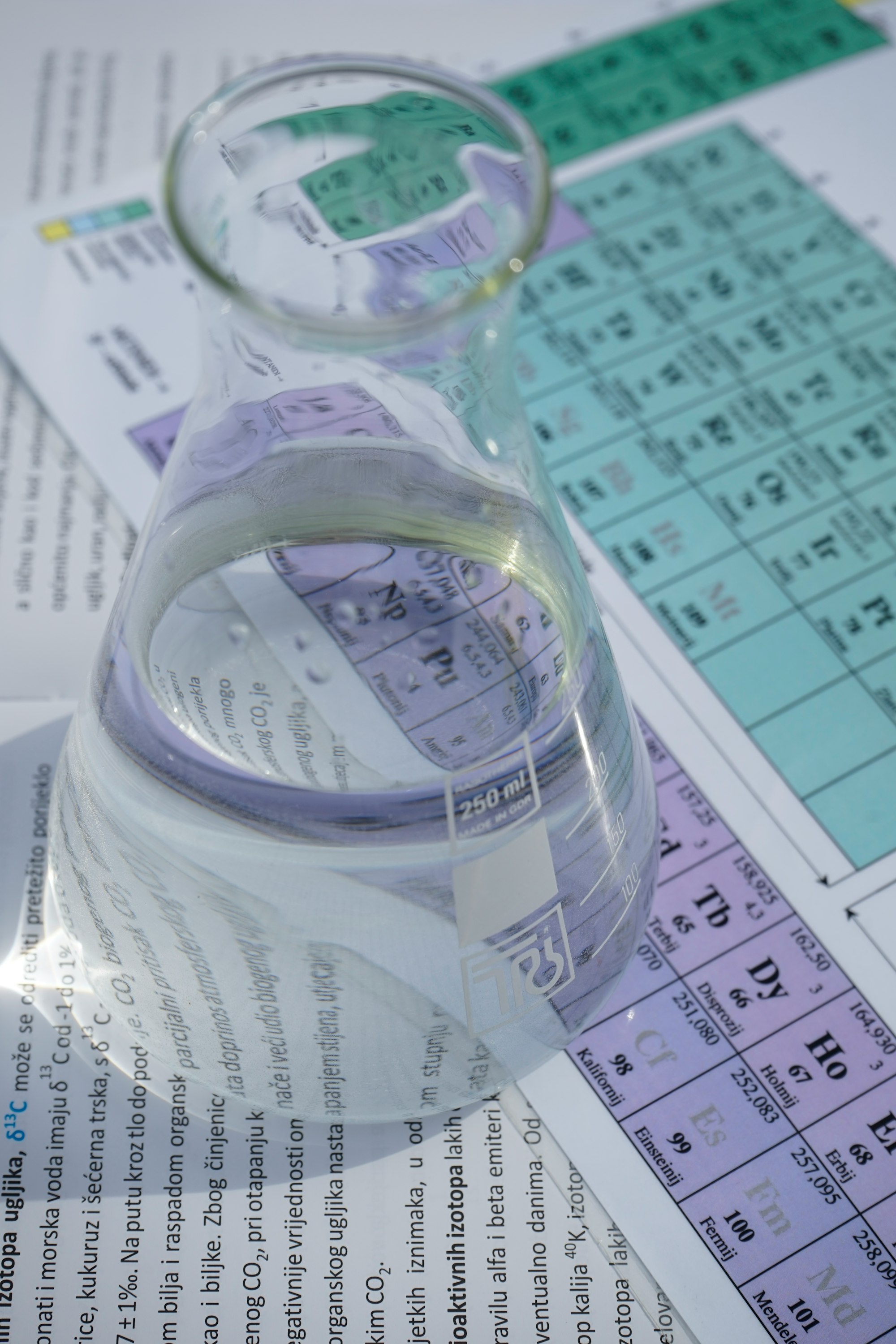
Here's my research if you're interested in further reading on EDCs:
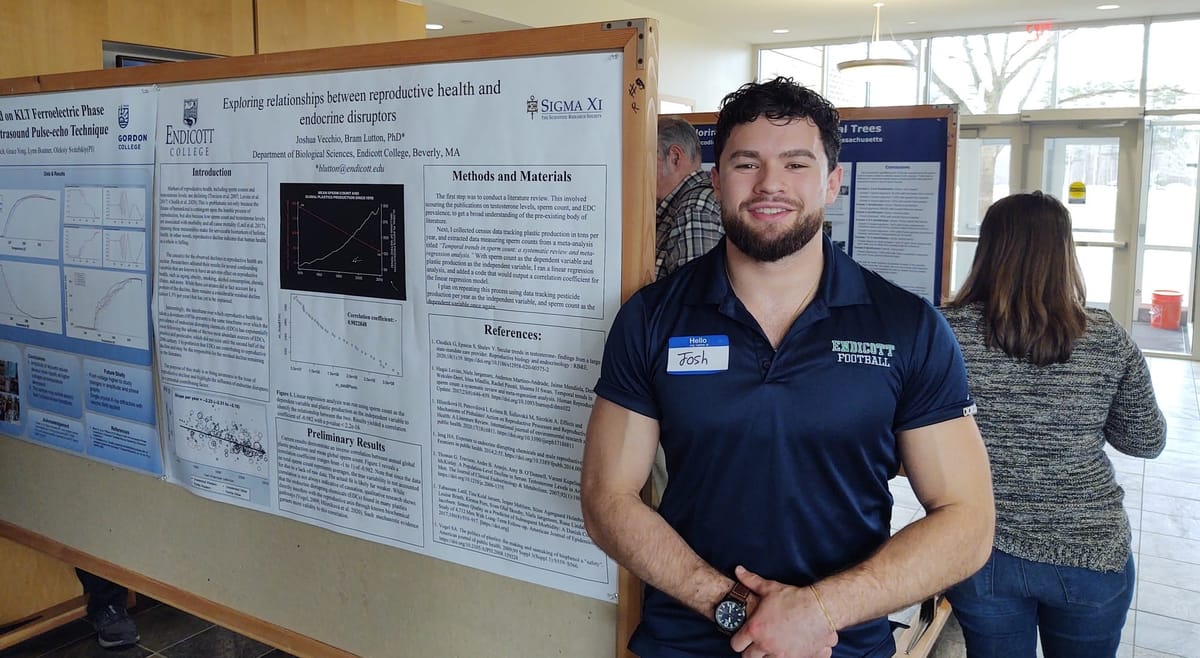
- Vices - Substances like alcohol and marijuana, and habits like porn and masturbation, in excess, can have a detrimental effect on testosterone levels, so you ought to eliminate them.
Follow the protocols above for six months and I promise you, you'll feel like a new man.
Testosterone Transformation Academy
If you feel that you could benefit from personalized support to implement these protocols into your life, the link below will lead you to more information on the Testosterone Transformation Academy; a men’s health coaching program specifically designed to help men like you optimize their testosterone levels naturally.

I wish you the best in your journey.
With reverence, Josh
References
- Avila, D., Gittens, P. R., Hwang, K., Weedin, J. W., Rumohr, J. A., & Lipshultz, L. I. (2010). Low dose human chorionic gonadotropin prevents azoospermia and maintains fertility in hypogonadal men on testosterone replacement therapy. Fertility and Sterility, 94(4, Suppl.), S128–S129. https://doi.org/10.1016/j.fertnstert.2010.07.519
- Hariharan, V., & Hempragadish, J. G. (2024). Paleo diet and its relationship with testosterone levels. Biomedicine, 44(3), 317–324.
- Herati, A. S., Kohn, T. P., & Kassiri, B. (2020). New frontiers in fertility preservation: A hypothesis on fertility optimization in men with hypergonadotrophic hypogonadism. Translational Andrology and Urology, 9(Suppl. 2), S171–S177. https://doi.org/10.21037/tau.2019.12.39
- Lee, J. A., & Ramasamy, R. (2018). Indications for the use of human chorionic gonadotropic hormone for the management of infertility in hypogonadal men. Translational Andrology and Urology, 7(Suppl. 3), S348–S352. https://doi.org/10.21037/tau.2018.04.11
- Mederos, M. A., Bernie, A. M., Scovell, J. M., & Ramasamy, R. (2015). Can serum testosterone be used as a marker of overall health? Reviews in Urology, 17(4), 226–230.
- Patel, A. S., Leong, J. Y., Ramos, L., & Ramasamy, R. (2019). Testosterone is a contraceptive and should not be used in men who desire fertility. The World Journal of Men’s Health, 37(1), 45–54. https://doi.org/10.5534/wjmh.180036
- Rambhatla, A., Mills, J. N., & Rajfer, J. (2016). The role of estrogen modulators in male hypogonadism and infertility. Reviews in Urology, 18(2), 66–72. https://doi.org/10.3909/riu0711
- Smit, D. L., Verdegaal, T., & Bond, P. (2025). Efficacy of human chorionic gonadotropin hormone in restoring spermatogenesis in men using non-prescribed androgens: A retrospective analysis of real-world data. F&S Reports, 6(2), 120–126. https://doi.org/10.1016/j.xfre.2025.03.001
- Tan, R. S., Cook, K. R., & Reilly, W. G. (2015). High estrogen in men after injectable testosterone therapy: The low T experience. American Journal of Men’s Health, 9(3), 229–234. https://doi.org/10.1177/1557988314539000










